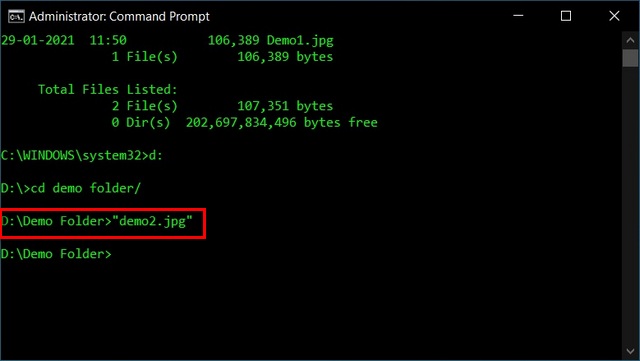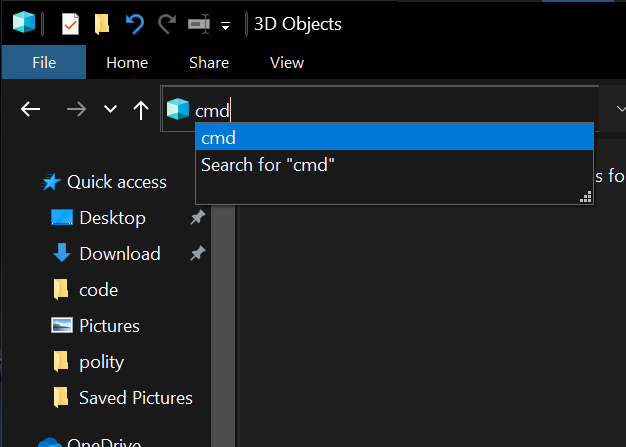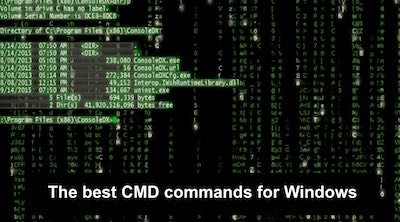
Now we know the syntax of the find command, let's look at some examples.

#Cmd find file command drivers
Drivers communicate with block devices by sending and receiving entire blocks of data. Files that are used to access block devices are called block device files. Examples include keyboards, sound cards and mouse.ī – Block devices. Drivers communicate with character devices by sending and receiving single characters (bytes, octets). Files that are used to access character devices are called character device files. Symbolic links point to files and are similar to shortcuts.Ĭ – Character devices. These are the folders under consideration. They can be any of the below:į – Regular file such as text files, images and hidden files.ĭ – Directory. -type represents the file descriptors.which represent root and current directory, respectively. This is the starting point to search files. /path is the path where file is expected to be found.The find command lets you efficiently search for files, folders, and character and block devices.īelow is the basic syntax of the find command: find /path/ -type f -name file-to-search In this article, we will discuss the find command with some examples. There is a powerful command in Linux that helps you search for files and folders called find. But in certain environments like GUI-less servers, you need to search for files using the command line. C, -c-style Allow C-style extended characters (\xFF\0\t\n\r\\ etc.Searching for files is relatively easy when you are using a GUI. B, -binary Also search (and replace) in binary files (CAUTION) f, -filename Find (and replace) filename instead of contents

w, -word Match whole word (uses C syntax, like grep) n, -line-number Print line number before each line (1-based) v, -invert Print lines NOT containing the find string i, -ignore-case Case insensitive text comparison c, -count Only show filenames, match counts and totals r, -recursive Process sub-folders recursively q, -quiet Suppress output to stdio / stderr h, -help Show this help message (ignores other options) Below is the FART /? options I see exaplaining the options. You also may want to consider excluding the -r option if you're only changing the text in a SINGLE file (i.e. You can also add the capital -V switch (see below example) to get verbose detail of the error message if needed to troubleshoot further, but I've resolved this issue with F.A.R.T and a space in a replacement string by adding the double-quotes around it as in my below example #2.Įxample #2 fart -i -C -V "C:\Users\user\Desktop\test\testzzz.txt" "\\changeme" "\\server\share name"

Give that a shot and then perhaps you can just continue to keep using it without further change.ĮXAMPLE "%~dp0Software\fart" -i -r "%~dp0Software\config.cfg" "\\changeme" "%N%" Set-Content "C:\Users\user\Desktop\test\testzzz.txt"įor the F.A.R.T issue with spaces specifically, I think you just need to add double-quotes around the strings you're passing to it. "%~dp0Software\fart" -i -r "%~dp0Software\config.cfg" \\changeme %N%Įxample PowerShell syntax below for find and replacement of strings within a specific file.ĮXAMPLE (Get-Content "C:\Users\user\Desktop\testtestzzz.txt") |įoreach-Object | Many thanks echo.Įcho F| XCOPY "%~dp0Software\client.txt" /y "%~dp0DSoftware\config.cfg" Wonder I can do this purely in batch without farting. Is there a better way to do this, better tool, seen power shell is good, but I don't know what versions im going to arrive at so could be more trouble changing the codes to suit the versions. I looked into all the switches and none seem to be let me replace text with a space in it. This has been working a treat, till today where there was a space in the path to the sharedĪnd FART doesn't understand spaces and breaks with syntax error's and things. Then FART will replace changeme with \server\shared to complete fully into I "mark" this in the CMD window and paste into user input prompt In the batch net use shows location of a shared folder on the net work In my text file in need to change often I have a defined path changeme\software\sql I have been using F.A.R.T and simple batch to edit a txt file with the out put of the net use command:


 0 kommentar(er)
0 kommentar(er)
